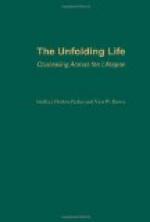God’s conception of life is surely greater than these, yet He never gave a definition. Jesus said it is more than meat, that it is worth more than all the world, that it does not consist in abundance of things, that it is eternal, but He nowhere tells us what it is, for He can not. It is a part of God. He can only make us understand it in any wise by giving its characteristics and values. Perhaps these may come to us more clearly through considering first what life is not.
1. Life is not merely “plastic clay” to be moulded, or a “block of marble” to be hewn according to the will of the sculptor.
This poetic conception emphasizes rightly the tremendous power of environment and personality in shaping character, but it is really a dangerous half truth. If the child were a block of marble, he would be no different from the dead, inert lump that lies in the studio awaiting the will of the sculptor. They would both be things. But a child has life, and the difference between life and thing lies in an inner power or activity which life possesses and uses when and as it will. This activity has to be reckoned with. Sun and rain and earth can not make a plant grow if it does not use its own mysterious inner force upon them. No sort of influence can affect a life, if the life does not respond to it. This response will be either receiving or rejecting the influences that come, working with or against them. Assuredly this is a condition very different from “plastic clay.” Two great tasks, therefore, are included in the work of nurture: the first, to see that all that comes to plastic life from the outside is what it ought to be; the second, to somehow arouse the power within to vigorous effort upon the best things.
2. Life is not a “pure white page,” even in its beginning.
There is here also a half truth, and an error. Life is unstained by guilt in its early years. It comes innocent from the hand of God, but fingers long since vanished have traced lines that mar the perfect whiteness. There are tendencies away from God as well as toward Him, and these are not the result of environment. Environment will cultivate tendencies but can not implant them. Favoring conditions will make an apple tree produce magnificent apples, but they will never implant in it any tendency to bear roses or produce thorns. Failure to recognize the fact of two sets of tendencies in the life will lead to a fatal mistake in nurture. Christ will be presented only as an Example and not as a Savior also, thus setting before a life its pattern and leaving it impotent to reach it.
3. A life in its beginning is not a “little man.”
The element of truth in this conception is perhaps less than in either of these preceding. It is indeed true that child life is that out of which man life is to come, but the difference is more vital than that of inches or strength. The bulb shelters a lily life, but the difference is greater than size. The chrysalis will bring forth the butterfly, but the two are not identical. Childhood will unfold into manhood, but each has its own characteristics and needs, differing in largest degree.




